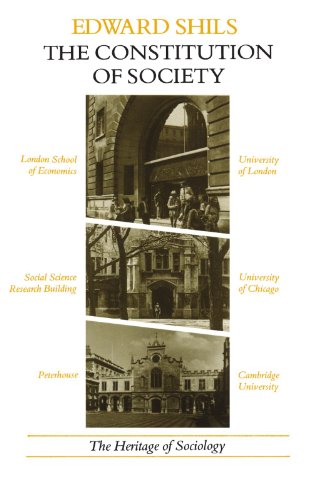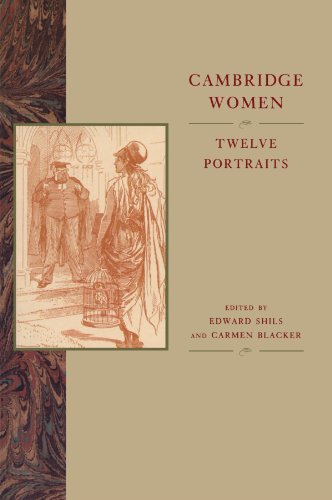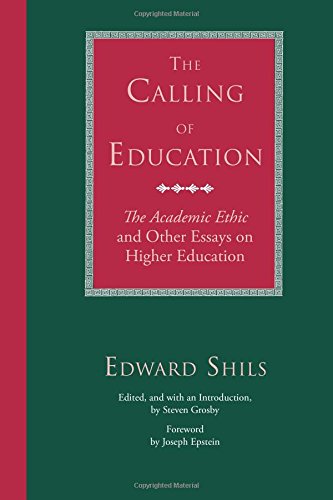Background
Edward Shils was born on July 1, 1910 in Springfield, Massachusetts.



( Edward Shils's attempt to work out a macrosociological ...)
Edward Shils's attempt to work out a macrosociological theory which does justice both to the spiritual and intellectual dispositions and powers of the mind and to the reality of the larger society is an enterprise that has spanned several decades. In his steps toward the development of this theory he has not proceeded deductively; rather he has worked from his own concrete observations of Western, Asian, and African societies. Thus, despite the inevitable abstractness of marcrosociological theory, the papers in this volumewhich have been published separately since the Second World Warhave a quality of vivid substantiality that makes the theoretical statements they present easier to comprehend. Professor Shils has attempted to develop a theory that has a place for more than those parts of society that are generated from the biological nature of human beings and those parts that are engendered by the desires of individuals, acting for themselves or for groups and categories of individuals, to maintain and increase their power over other human beings and to secure material goods and services for themselves. He has argued that there are constituents of society in which human beings seek and cultivate connections with objects that transcend those needed to satisfy biological necessity and the desire for material objects and power over others. This third stratum of social existence, he concludes, cannot be reduced to the other two and cannot be disregarded in any serious attempt to understand the function of any society. Thus Edward Shils, without disregarding its many valuable achievements, has nevertheless parted ways with much of modern sociology. For this collection of papers the author has written an introductory intellectual autobiography that places each essay in the setting of the development of his thought and that connects it with his other writings.
http://www.amazon.com/gp/product/0226753298/?tag=2022091-20

( Tradition, by esteemed sociologist Edward Shils, was th...)
Tradition, by esteemed sociologist Edward Shils, was the first book to fully explore the history, significance, and future of tradition as a whole. Intent on questioning the meaning of the antitraditionalist impulse in today's society, Shils argues here that the tendency to distrust and rebel against tradition is at the heart of tradition itself; only through suspicion and defiance does tradition actually move forward. Revealing the importance of tradition to social and political institutions, technology, science, literature, religion, and scholarship, Tradition remains the definitive work on this vital element of our society. "Shils is a man of fabled learning, whose mind purrs powerfully like the moth at dusk. I hesitate to use the word conservative of him because it misses the central concern of his work, which is not conservatism, but the conservation of those human resources and achievements which are richest, and matter most."David A. Martin, Times Literary Supplement "Tradition is the first comprehensive treatment of the subject that encompasses the totality of tradition in all its multifaceted variables and functions. . . . It is a landmark analytical and theoretical sociological study that not only fills a need but also provides a basic model and impetus for further research."H. Leon Abrams Jr., Sociology
http://www.amazon.com/gp/product/0226753263/?tag=2022091-20

(This is a collection of portraits of twelve outstanding w...)
This is a collection of portraits of twelve outstanding women who lived and worked in Cambridge during the century before women were admitted fully to membership of the University. The subjects include Jane Harrison, distinguished scholar of Greek religion, Mrs. Sidgwick, founder of Newnham College, Eileen Power, medieval historian, Nora Chadwick, scholar of Norse and Celtic, Honor Fell, cell biologist and founding force behind the Strangeways Laboratory, and Rosalind Franklin, whose work on DNA was essential to the Watson-Crick model.
http://www.amazon.com/gp/product/0521483441/?tag=2022091-20

( Throughout his long and prolific career, Edward Shils b...)
Throughout his long and prolific career, Edward Shils brought an extraordinary knowledge of academic institutions to discussions about higher education. The Calling of Education features Shils's most illuminating and incisive writing on this topic from the last twenty-five years of his life. The first essay, "The Academic Ethic," articulates the unique ethical demands of the academic profession and directs special attention to the integration of teaching and research. Other pieces, including Shils's renowned Jefferson lectures, focus on perennial issues in higher learning: the meaning of academic freedom, the connection between universities and the state, and the criteria for appointing individuals to academic positions. Edward Shils understood the university as a great symphonic conductor comprehends the value of each instrument and section, both separately and in cooperation. The Calling of Education offers Shils's insightful perspective on problems that are no less pressing than when he first confronted them. Edward Shils (1910-1995) was distinguished service professor in the Committee on Social Thought and the department of sociology at the University of Chicago. Among his many books published by the University of Chicago Press are Portraits: A Gallery of Intellectuals and the three-volume Selected Papers of Edward Shils.
http://www.amazon.com/gp/product/0226753395/?tag=2022091-20
Edward Shils was born on July 1, 1910 in Springfield, Massachusetts.
Shils grew up in Philadelphia, where he went to high school. Though he taught sociology and social thought, he did not have a formal degree in those fields. His undergraduate degree, from the University of Pennsylvania, was in French literature. He came to the attention of Louis Wirth, a distinguished sociologist at the University of Chicago, who hired Shils as a research assistant. Thereafter, Shils became recognized as an outstanding teacher in the field of sociology. His knowledge of the literatures of numerous cultures and fields was deemed to be impressive. He taught sociology, social philosophy, English literature, history of Chinese science and other subjects.
In 1947 he delivered a series of lectures in London on primary groups in the social structure, focusing especially on some earlier research he had done (with Morris Janowitz) on the dissolution of the German army during the war. Meanwhile, he continued his close connection with the atomic scientists' movement. In 1949 the sociologist Talcott Parsons invited Shils to Harvard University to join him in writing what was to become a major sociological document of the mid-20th century-Toward a General Theory of Action (1951)-and in developing what they called action theory. " Shils' acceptance renewed a friendship that had begun in 1936, when they first met at the University of Chicago. Together Parsons and Shils attempted to construct an all-inclusive sociological theory that would provide a unified understanding of society, that would find an interconnectedness of all things social. Shils described Parsons as a saint of sociology, " and their collaboration persisted until Parsons' death in 1979. Return to the University of Chicago From 1952 to 1953 Shils lectured at the University of Manchester, and in late 1953 he returned to the University of Chicago with a joint appointment to its Committee on Social Thought, an interdisciplinary program in the social sciences, and to the Department of Sociology. Here he remained until his retirement in 1985. New interests now engaged him: the plight of the intellectual in a time of conservative reaction to thought deemed to be radical or unpopular; academic freedom; mass culture; and the proper organization of intellectual institutions which would enable them to meet their intellectual and social obligations. " He visited India for an extended period in 1955 and 1956, and returned every year but one until 1967. In 1962 he created the quarterly journal Minerva to deal with matters of science policy and higher education. He was invited by the University of Kent in Canterbury to deliver the T. S. Eliot Memorial Lectures in 1974; his subject was the part played by tradition in modern life. In 1983 he received the International Balzan Prize, awarded by an Italian foundation for fields without Nobel Prizes. In presenting Shils the prize, the foundation cited him for combining the empiricism of American sociology with the theoretical thinking of European sociologists, thus contributing toward a truly universal general sociology. " He was the first sociologist, and the second social and moral" scientist after Jean Piaget, to be given that honor. Although Shils investigated a wide variety of social phenomena, the central concern of his work was his attempt to answer the age-old question: how is society possible? His answer was a sociological one, rooted both in the classic sociological tradition of Georg Simmel, Max Weber, and Emile Durkheim and in the American writings of Robert E. Park, W. I. Thomas, and Charles Cooley. He argued that societies exist through the varieties of ties people form to one another-in small groups, large collectivities, or even social classes or nations-the ideologies or systems of beliefs that make some ties more permanent than others, more important than others. One can understand a particular society or societies in general by looking not at a single moment in time but at a series of connected moments-developing what Park called a natural history" and noting the consistencies or changes from moment to moment. However, the strength or location of social ties does not yet tell the whole story. Ideology, religion, science, and media culture are all essential to persistence and change in society, and, unless they are understood in all their richness and variety, one cannot possibly understand the social order. It was Shils' sensitivity to the interplay between ideas and action that was at the core of his sociological work and which linked him to the larger tradition of social thought. Perhaps Shils best characterized his efforts (on the opening page of the first issue of Minerva) as the improvement of understanding. " Shils taught every year for 56 years-teaching his last class at the age of eighty-four. In the last fifteen years of his life he concentrated his attention on clarifying the nature of what he called collective self-consciousness. By the term collective self-consciousness, he meant the self-consciousness of a collectivity, in particular a society. He thought that society was a real entity. Among his good friends were to be found many scientists: the Hungarian physicist Leo Szilard, the German physicist Heinz Maier-Leibniz, and the American physicist Alvin Weinberg. He knew much about governmental policy toward the natural sciences; one of the areas covered by Minerva) was the influence of government on scientific research. In 1979, he was selected by the National Council on the Humanities to give the Jefferson Lecture, the highest national honor given in the field of the humanities.
He was known for his research on the role of intellectuals and their relations to power and public policy. His work was honored in 1983 when he was awarded the Balzan Prize. In 1979, he was selected by the National Council on the Humanities to give the Jefferson Lecture, the highest award given by the U. S. federal government for distinguished intellectual achievement in the humanities.
( Edward Shils's attempt to work out a macrosociological ...)
(This is a collection of portraits of twelve outstanding w...)
( Throughout his long and prolific career, Edward Shils b...)
( Tradition, by esteemed sociologist Edward Shils, was th...)
(Modern Political Philosophy)
